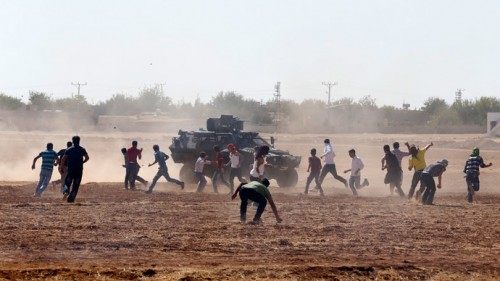
In a graphic illustration of the domestic and regional impact of the deepening crisis, demonstrations turned violent and Turkish police used teargas and water cannon.
Following a warning from the Turkish president, Recep Tayyip Erdoğan, that Kobani was “about to fall”.
Turkish media reports said up to 14 people had been killed in eastern cities and dozens more wounded. The toll included eight deaths in the eastern city of Diyarbakir, the Dogan news agency said. One man was reported to have been killed by a bullet to the head in Varto in the eastern province of Mus when police allegedly fired live ammunition.
Clashes also took place at protests in the western cities of Ankara and Istanbul. Curfews were imposed in five Turkish provinces were placed under curfew.
Erdoğan, speaking in the eastern city of Gaziantep, said that a ground operation was needed to defeat Isis – sidestepping accusations that he is unwilling to allow Kurds in Turkey to help their embattled kinfolk in Syria or to deploy the army across the border to fight Isis because of the country’s historic enmity towards Kurdish separatists – in addition to ongoing peace negotiations with them.
“I am telling the west – dropping bombs from the air will not provide a solution,” the president said to cheers from crowds of Syrian refugees in a speech that was translated into Arabic. Erdoğan also tested the readiness of the US, Britain, France and other allies by calling for a no-fly zone and a secure land zone as well as training for moderate Syrian rebels.
The Turkish parliament last week authorised the government to take military action against Isis. But Turkey has not announced plans for any operations, with Ankara apparently seeking a commitment from the west to move decisively against the Syrian president, Bashar al-Assad, as well as the jihadis. Erdoğan said he wanted to fight both Isis and the Kurdistan Workers’ party (PKK).
France said on Tuesday that it was vital to act in order to stop the Isis advance. “Everything must be done so that the Daesh (Isis) terrorists are stopped and pushed back,” the French foreign minister, Laurent Fabius, told parliament. “A tragedy is unfolding, and we must all react.”
If Kobani does fall, Turkey is likely to face a massive backlash from its Kurdish population. Thousands of people have already arrived on the border from all over the country to offer their support. “If they take Kobani, we know they will come to Suruc,” said Ibrahim Akkus, watching from the nearby hillside on Tuesday.
Isis now controls large parts of both Syria and Iraq and has ramped up its offensive in recent days despite being targeted by US-led air strikes.
On the Turkish side of the border, journalists heard the sound of warplanes before two large plumes of smoke billowed west of Kobani. But the air attacks appear to have done little to slow Isis. The BBC reported eight strikes in total.
Hours after two of the group’s black flags were raised on the outskirts of the town on Monday, the militants punctured the Kurdish frontlines and advanced into the town itself, said the local coordination committee.
“They’re fighting inside the city. Hundreds of civilians have left,” said the director of the Syrian Observatory for Human Rights, Rami Abdurrahman. “IS controls three neighbourhoods on the eastern side of Kobani. They are trying to enter the town from the south-west as well.”
Capturing Kobani would give Isis, a direct link between its positions in the Syrian province of Aleppo and its stronghold of Raqqa, further east. It would also give the group full control of a long stretch of the Turkish-Syrian border.
Kobani residents described seeing Isis fighters looking “relaxed” and walking freely in the streets. But those who entered were soon killed by Kurdish fighters who are more familiar with the locality. “I don’t know where they were all coming from, but once they were killed, more Isis would come,” a man named Mahmoud said as he walked from Kobani to a nearby town. He said he believed that the Isis men were using hard drugs because of their confident demeanour. Looking exhausted, the 50-year-old lamented that he could not stay in his home town to fight.
“If I die, who will look after my children?” he asked. “I want to go to my land. I don’t want to live in Turkey. I don’t want to live in any country. I just want to live in my own land. Why is Isis coming to my land? The world has turned its back on Kobani.”
In Istanbul, hundreds of nationalists attacked an office of the pro-Kurdish Democratic People’s party (HDP) with sticks and knives, trapping around 60 people inside the building. In another neighbourhood, groups of pro-Kurdish protesters set fire to the building of the local Nationalist Movement party (MHP) after shots were reportedly fired from there.
Protests across Turkey were accompanied by pro-Kurdish demonstations elsewhere, including at the European parliament in Brussels. In Cypus, a protester urged the US to “hit the jihadists harder” to help Kurdish forces defend Kobani.
The Guardian

Leave a Reply
You must be logged in to post a comment.